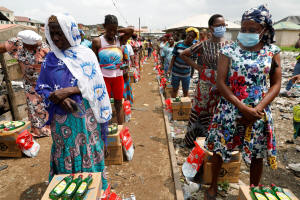Pandemic disruptions push millions of Nigerians into hunger
 Send a link to a friend
Send a link to a friend
 [July 15, 2021]
By Libby George and Estelle Shirbon [July 15, 2021]
By Libby George and Estelle Shirbon
LAGOS/LONDON (Reuters) - Shehu Ismaila
Gbadebo has worked as a barber for two decades. The money he made at his
rented stall in a bustling suburb of Nigeria's megacity, Lagos, used to
be plenty for him to pay bills and set aside some savings. Now, he
relies on donated food and sometimes skips meals to feed his family.
Since COVID-19 hit Africa's most populous nation and biggest economy,
prices for some staples such as eggs, onions and palm oil, have risen by
30% or more. Fewer people can afford a haircut, and those who can are
demanding discounts off Gbadebo's 500 naira ($1.22) rate.
"The money I have is not enough for what we need," Gbadebo, 38, told
Reuters after tending a customer.
Millions of Nigerians like Gbadebo, who were once on solid financial
footing, can no longer reliably feed themselves or their families.
Roughly 18% of households in Nigeria have at least one adult who does
not eat for an entire day at a time, compared with 6% before the
pandemic, according to the World Bank. Inflation is near an all-time
high, and food prices account for almost 70% of the rise.
The U.N. food agency has warned that food import costs worldwide are
expected to surge to records this year, as price increases for nearly
all agricultural commodities and a rally in energy prices boost
production and shipping costs.

But in Nigeria, galloping inflation is combining with the impact of a
teetering economy, rising unemployment and insecurity in farming regions
to pull even the formerly middle class into dire straits.
Some experts warn of worsening malnutrition and the potential for
unrest.
"What we are experiencing in Nigeria is different from what is being
experienced all over the world," said Idayat Hassan, director of the
Abuja-based think-tank Centre for Democracy and Development, adding that
the nation's limited social safety net left millions with little help.
"Crime is actually skyrocketing on daily basis, because people are
trying to make ends meet."
DOUBLE THE COST
On a cloudy Saturday afternoon, dozens of women lined up in the
Oworonshoki neighbourhood on the edge of the Lagos lagoon as the Lagos
Food Bank Initiative distributed packs of rice, oil and other
essentials.
Food bank president Michael Sunbola said demand was
40% higher than before the pandemic. The distribution in mixed-income
Oworonshoki, where brick apartment blocks buttress ramshackle shanties,
was new.
[to top of second column]
|

Women queue for food parcels during distribution by volunteers of
the Lagos food bank initiative in a community in Oworoshoki, Lagos,
Nigeria July 10, 2021. REUTERS/Temilade Adelaja

"Middle class families, people who would ordinarily not imagine
queuing up for food, are now in that category of people that we
serve," Sunbola said.
The World Bank estimates that price shocks in 2020 pushed 7 million
additional Nigerians into poverty, an increase of nearly 10%. Marco
Hernandez, the World Bank's lead economist for Nigeria, said the
weakening naira, trade restrictions and land border closures
targeting smuggling also boosted prices.
Cost increases hit the food bank too; a 100-kg (220-lb) bag of beans
that cost it 30,000 naira before COVID-19 hit now takes 65,000
naira, forcing it to cut the amount of food in each pack.
PRECIPITATING A CRISIS
Beans and other staples are grown mainly in Nigeria's increasingly
unstable north. Legislators warned in April the nation was "on fire"
due a wave of violence and lawlessness.
In November, Islamist militants beheaded dozens of farmers in
northeastern Borno state, and in the northwest, armed gangs
kidnapping for ransom are driving farmers to abandon their fields.
An official in northwestern Kaduna state warned insecurity had
already hit crop yields and was "precipitating a food crisis".
Back in Lagos, Gbadebo the barber said his wife, currently at home
with their three children, including a one-month-old baby, would
soon start working to help support the family.
"It's not easy," he said. "Before COVID everything was a bit
better."
(Reporting by Libby George in Lagos and Estelle Shirbon in London;
Additional reporting by Nneka Chile and Seun Sanni in Lagos; Editing
by Alex Richardson)
[© 2021 Thomson Reuters. All rights
reserved.] Copyright 2021 Reuters. All rights reserved. This material may not be published,
broadcast, rewritten or redistributed.
Thompson Reuters is solely responsible for this content.
 |